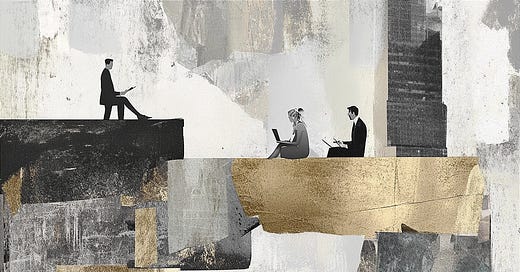Welcome to Unknown Arts, where builders navigate AI's new possibilities. Ready to explore uncharted territory? Join the journey!
For my entire career, I've built software to help people work better. Every feature, every workflow, every interface was designed to be a more effective tool in human hands.
But something profound is happening: software is evolving from a tool we use into a workforce we manage.
This isn't just another iteration of SaaS (Software as a Service). It's the emergence of something new: SaaW (Software as a Workforce). And it's about to change everything about how we build and interact with technology.
The signs are everywhere, if you know where to look. While companies trim thousands of management roles today, they're simultaneously investing heavily in AI capabilities. Here's the irony: the workforce that remains will increasingly become managers themselves – not of people, but of AI teams that create, analyze, and iterate on our behalf.
Software isn't just making us better—it's working alongside us
The SaaS revolution expanded software's impact by giving us access to continuously improving tools in the cloud. But at its core, SaaS was still about making us better at our jobs. We automated tasks and enhanced collaboration, but remained firmly in the driver's seat.
I've noticed a shift in my work that feels significant: I'm no longer just creating better tools – I'm building and onboarding an AI team.
I'm crafting prototypes of specialized AI teammates for multiple roles: a creative thought-partner to explore new ideas, a writing editor to refine my rough drafts, a graphic designer to handle newsletter visuals. Each one requires the kind of upfront investment you'd expect when bringing on a new team member – conveying context, establishing guidelines, defining workflows, and aligning them with my project's goals and style.
This changes who gets access to specialized support
Throughout history, influential people have relied on teams of specialists to multiply their impact. Executives had analysts and assistants, performers had producers and promoters, writers had editors and researchers. But building a support staff was a luxury reserved for the wealthy or well-funded.
Something powerful happens when you start thinking about AI as a workforce rather than a tool. Suddenly, support that was previously out of reach for independent creators becomes accessible.
I'm experiencing this firsthand. Instead of working alone, I now have:
An AI editor who helps refine and strengthen my ideas
An AI designer who transforms my concepts into graphics
An AI developer who turns my specs into working code
No, they're not perfect replacements for human experts – but they're capable enough to change the game for someone like me. And soon enough, they'll change the game for us all.
Your relationship with the work fundamentally shifts
Leading a team, whether of humans or AIs, transforms your role. Instead of doing everything yourself, you become an orchestrator of work. This isn't just about automation – it's about changing where you spend your energy. Like any good manager, my job is increasingly about providing clear context upfront and then applying my expertise to refine and polish the output.
Managing this new workforce demands new skills. I'm learning to write better briefs, developing new quality control instincts, and most importantly, finding ways to preserve my creative vision while embracing the possibilities of AI collaboration.
We're at the very beginning of this shift
I'll be honest: this shift challenges my identity as a craftsman. My pride has always come from the ability to express my ideas via hands-on creation, my gradual personal mastery.
But the future demands I evolve - from a craftsman into a conductor, from a tool user into a team leader. So I'm leaning in, learning to preserve what matters while embracing new ways of creating.
The shift from SaaS to SaaW is just beginning. What feels cutting-edge today will seem quaint tomorrow. By engaging thoughtfully now, we can help steer this evolution.
Let's enrich human creativity rather than replacing it.
Until next time,
Patrick
Interested in working together? Check out my portfolio.
Find this valuable?
Share it with a friend or follow me for more insights on X, Bluesky, & LinkedIn .







Great post! AI won't replace people but people who know how to use AI tools effectively will replace those who don't
Love the thoughts. We are adapting to a new way of creation, expanding our mindsets from how to use AI as a tool to how to lead a team of AI partners effectively.